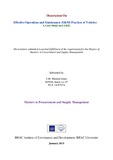| dc.description.abstract | LGED has the reputation as an “island of excellence” in the Government, with high standards of professionalism, and comparatively robust risk management systems. The report begins with a brief assessment of external environmental factors that affect LGED’s ability to adopt reforms to effectively address potential fiduciary & operational risks throughout the value chain of public expenditure for rural and urban infrastructure. This study has examined the present operations management practices of large fleet of vehicles at LGED Head Quater and analyze its effectiveness and compliance with existing rules and regulations of Bangladesh. To fulfill the overall objective of this study has undergone an in-depth procedure on verification of vehicle usages and allocation of vehicle procedures, it estimate preparation and approval procedures for maintenance, procurement process, has also checked procurement process as a tool for Public Procurement Rules (PPR-2008). Factors at the national level include weaknesses in electoral, legislative, judicial and agency accountability, outmoded civil service rules and practices, lack of national audit capacity, and high levels of corruption. Progress in nationwide reforms for combating corruption and improving financial management and procurement has been encouraging in recent years, but there is a risk that it may not be sustained by the next political government. At the sub-national level, LGED is subject to two lines of accountability. On the one hand, LGED has a sizeable budget of its own for implementing infrastructure programs at various levels of government. Here there is a strong emphasis on administrative and financial procedures to ensure the probity, integrity and effectiveness of activities. On the other hand, LGED also implements and manages rural and urban infrastructure funded under Annual Development Program allocations of sub national jurisdictions. In these cases, while there is a clearer accountability link to beneficiaries through their elected officials, risks can still arise due to weaknesses in local governance in planning, decision making and management. These risks need to be mitigated through local government reforms that will create a more efficient, effective and transparent environment within which LGED can function in the future. The report gives a brief internal organizational assessment of LGED, reviewing its evolution from a rural works component of the integrated rural development program of the early 1960s to its formalization and rapid growth as a public sector department. Key functions are assessed, including human resources and financial management, procurement, engineering and ICT systems, corporate governance, and approach to land use and resettlement. The report confirms LGED’s excellent reputation for professionalism, including quality delivery of many contracts on time and on budget. Although information and communication systems are relatively advanced in LGED compared to other government departments, the use of many different, non-integrated systems with inadequate supervision by core staff with ICT skills make it difficult for LGED to gather critical information needed to compare the results of the various projects, and complicates the reporting and control procedures within LGED (e.g. benchmarking, and detecting patterns indicating possible collusion on bids).
It has been discussed elaborately the strategy for benefits of improvement of communication system, its contribution to education sector, women empowering through women participation in rural infrastructure, community and local administration development as well as poverty reduction through participation of local level stakeholders and beneficiaries etc. | en_US |

